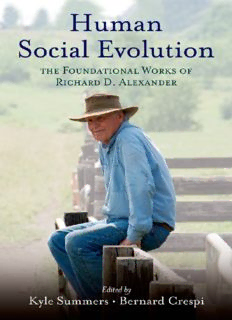
Crespi, B. J., Summers, K. [eds] - Human Social Evolution. The Foundational Works of Richard D. Alexander [2013] PDF
Preview Crespi, B. J., Summers, K. [eds] - Human Social Evolution. The Foundational Works of Richard D. Alexander [2013]
Human Social Evolution Human Social Evolution THE FOUNDATIONAL WORKS OF RICHARD D. ALEXANDER Edited by Kyle Summers and Bernard Crespi Oxford University Press is a department of the University of Oxford. It furthers the University’s objective of excellence in research, scholarship, and education by publishing worldwide. Oxford New York Auckland Cape Town Dar es Salaam Hong Kong Karachi Kuala Lumpur Madrid Melbourne Mexico City Nairobi New Delhi Shanghai Taipei Toronto With offices in Argentina Austria Brazil Chile Czech Republic France Greece Guatemala Hungary Italy Japan Poland Portugal Singapore South Korea Switzerland Thailand Turkey Ukraine Vietnam Oxford is a registered trademark of Oxford University Press in the UK and certain other countries. Published in the United States of America by Oxford University Press 198 Madison Avenue, New York, NY 10016 © Oxford University Press 2013 All rights reserved. No part of this publication may be reproduced, stored in a retrieval system, or transmitted, in any form or by any means, without the prior permission in writing of Oxford University Press, or as expressly permitted by law, by license, or under terms agreed with the appropriate reproduction rights organization. Inquiries concerning reproduction outside the scope of the above should be sent to the Rights Department, Oxford University Press, at the address above. You must not circulate this work in any other form and you must impose this same condition on any acquirer. Library of Congress Cataloging-in-Publication Data Human social evolution : the foundational works of Richard D. Alexander / edited by Kyle Summers and Bernard Crespi. pages cm Includes bibliographical references. ISBN 978–0–19–979175–0 (alk. paper) 1. Alexander, Richard D.—Influence. 2. ISBN 978–0–19–979175–0 (alk. paper) 1. Alexander, Richard D.—Influence. 2. Alexander, Richard D. —Criticism and interpretation. 3. Human evolution. 4. Social evolution. 5. Natural selection. I. Summers, Kyle. GN281.H8495 2013 599.93’8—dc23 2013017153 9 8 7 6 5 4 3 2 1 Printed in the United States of America on acid-free paper CONTENTS Contributors Preface Introduction – Kyle Summers and Bernard Crespi PART I} General Foundations 1. Insect Behavior and Social Evolution Introduction: From Cricket Taxonomy to a Darwinian Philosophy of Man by Mary Jane West-Eberhard, Smithsonian Tropical Research Institute Excerpt from Alexander, R. D. 1969. Comparative animal behavior and systematics. In: Systematic Biology. Proceedings of the International Conference on Systematics (Ann Arbor, Michigan, July 1967). National Academy of Sciences Publication 1962: 494–517. 2. Cooperation Introduction: A New Theory of Cooperation by Steven Frank, University of California at Irvine Excerpt from: Alexander, R.D. 1986. The Biology of Moral Systems. New York: Aldine Press. 3. Eusociality in Naked Mole-Rats Introduction: Richard Alexander, the Naked Mole-Rat, and the Evolution of Eusociality by Paul Sherman, Cornell University Excerpt from Alexander, R.D., Noonan, K.M. and Crespi, B.J. 1991. The Evolution of Eusociality. In P. Sherman, J. Jarvis and R.D. Alexander (eds.). The Biology of the Naked Mole-Rat: 3–44. Princeton, NJ: Princeton University Press. 4. Parent-Offspring Conflict and Manipulation Introduction: The Evolution of Social Behavior by David Queller, Washington University Excerpt from Alexander, R.D. 1974. The evolution of social behavior. Annual Review of Ecology and Systematics 5:325–383. PART II} Human Social Evolution 5. Biology and Culture Introduction by Mark Flinn, University of Missouri Excerpt from Alexander, R.D. Evolution and culture. In Evolutionary Biology and Human Social Behavior: an Anthropological Perspective. N. Chagnon and W.G. Irons (eds.): pp. 59–78. North Scituate, MA: Duxbury Press. 6. Intergroup Competition and Within-group Cooperation Introduction: Thinking about Human Aggression, Past and Present: Alexander and Tinkle’s (1968) Review of Lorenz and Ardrey by Bobbi Low, University of Michigan Excerpt from Alexander, R.D. and Tinkle, D.W. 1968. Review of On Aggression by Konrad Lorenz and The Territorial Imperative by Robert Ardrey. Bioscience 18:245–248. 7. Kinship, Parental Care, and Human Societies Introduction: Concealed Ovulation in Humans: Further Evidence by Beverly Strassmann, University of Michigan Excerpt from Alexander, R.D. and Noonan, K.M. 1979. Concealment of ovulation, parental care, and human social evolution. In N.A. Chagnon and W.G. Irons (eds.). Evolutionary Biology and Human Social Behavior: An Anthropological Perspective. 436–453. North Scituate, MA: Duxbury Press. 8. Human Childhood Introduction: Altriciality, Neoteny, and Pleiotropy by Paul Turke, University of Michigan Altriciality: Why are human babies helpless? In Alexander, R.D. 1990. How Did Humans Evolve? Reflections on a Uniquely Unique Species. University of Michigan Museum of Zoology Special Publication 1:1–38. 9. Indirect Reciprocity Introduction: The Basis of Morality, Richard Alexander on Indirect Reciprocity by Karl Sigmund, University of Vienna Excerpt from Alexander, R.D. 1986. The Biology of Moral Systems. New York: Aldine Press. 10. The Evolution of Intelligence Introduction: Reflections on the Evolution of the Human Psyche by R.I.M. Dunbar, Oxford University Alexander, R.D. Evolution of the Human Psyche 1989. In P. Mellars and C. Stringer (eds.). The Human Revolution. Behavioral and Biological Perspectives on the Origins of Modern Humans: pp. 455–513. Princeton, NJ: Princeton University Press. 11. Evolution of Morality Introduction: Twelve (More) Things about the Evolution of Morality that Make People Nauseous by David Lahti, City University of New York Alexander, R.D. Biology and the Moral Paradoxes. Journal of Biological Structures 5:389–395. 12. Evolution and Humor Introduction: The Adaptive Significance of Humor by Stan Braude, Washington University Alexander, R.D. Ostracism and Indirect Reciprocity: The Reproductive Significance of Humor. 1986. Ethology and Sociobiology 7:253–270. 13. Ecological Constraints and Human Cooperation Introduction: Darwin’s Question: How Can Sterility Evolve? by Laura Betzig, The Adaptationist Program Excerpt from Alexander, R.D., Noonan, K.M. and Crespi, B.J. 1991. The Evolution of Eusociality. In P. Sherman, J. Jarvis and R.D. Alexander (eds.). The Biology of the Naked Mole-Rat: pp. 3–44. Princeton, NJ: Princeton University Press. 14. Evolution and Religion Introduction: The Concept of God as a Metaphor for Social Unity: Richard Alexander’s Hypothesis by William Irons, Northwestern University Religion, Evolution and the Quest for Global Harmony–Original essay for this volume 15. Evolution and the Arts
Description: